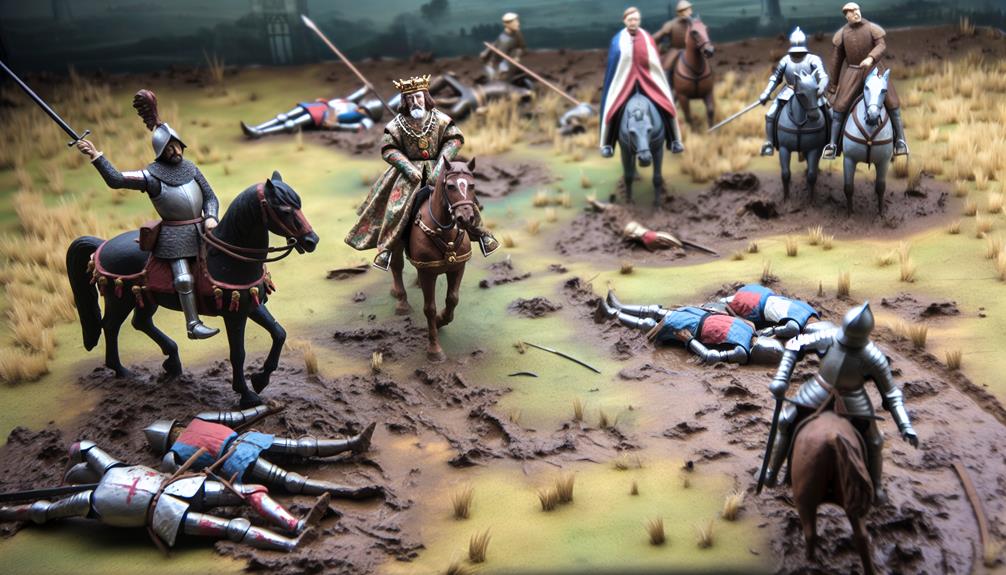The Battle of Agincourt, a pivotal moment in medieval history, serves as a proof to Henry V's military prowess and strategic acumen. Amidst the chaos of war, Henry V's leadership on the battlefield was unwavering, guiding his forces through adversity to secure a remarkable victory. However, behind the facade of triumph lies a complex web of political intrigue and personal ambition that shaped the course of events leading up to the fateful clash at Agincourt. As we explore the intricacies of this iconic battle, a deeper understanding of Henry V's triumph and its enduring legacy unfolds, shedding light on the true significance of this historic event.
Key Takeaways
- Henry V's meticulous planning and tactical acumen led to a decisive English victory.
- Heroic leadership inspired unparalleled courage and determination in troops.
- Ability to maintain morale was crucial for the eventual triumph of English forces.
- Leading from the front and active combat participation earned soldiers' respect.
- Victory celebration marked a turning point in the Hundred Years' War, solidifying Henry V's legacy as a legendary warrior king.
The Background of Agincourt
During the Hundred Years' War, the Battle of Agincourt took place on October 25, 1415, marking a significant conflict between the English and French forces. In the historical context of the time, the Hundred Years' War was a prolonged struggle between England and France for the French throne, with Agincourt being a pivotal moment in this conflict. Military tactics played a vital role in shaping the outcome of the battle. The English army, led by King Henry V, utilized innovative strategies such as the proficient use of longbows to counter the larger French forces.
Leadership qualities were paramount on the battlefield at Agincourt. King Henry V displayed exceptional leadership skills, rallying his troops and leading by example. His ability to inspire his soldiers and maintain morale in the face of adversity was instrumental in securing the English victory. On the other hand, the French forces, plagued by internal divisions and overconfidence, struggled to coordinate their attacks effectively.
Battle conditions at Agincourt were harsh and challenging for both sides. The English army faced unfavorable terrain and adverse weather conditions, which tested their resilience. Despite being outnumbered, they leveraged their knowledge of the battlefield to gain a strategic advantage. The French, on the other hand, found themselves bogged down in muddy terrain, which hindered their movements and led to disarray in their ranks. These factors, combined with the English military tactics and leadership, ultimately resulted in a decisive English triumph at the Battle of Agincourt.
Henry V's Military Strategy
Henry V's military strategy at the Battle of Agincourt showcased a combination of tactical innovation and decisive leadership that played a pivotal role in the English victory. His leadership tactics were characterized by meticulous planning and effective communication with his troops. Henry V employed a strategy that leveraged the English longbowmen's range and accuracy to weaken the French forces before engaging in close combat.
One of the key elements of Henry V's military strategy was his deployment of archers in a staggered formation, allowing them to maintain a continuous barrage of arrows on the advancing French army. This strategic positioning forced the French to advance under heavy fire, causing chaos and confusion among their ranks. Henry V's ability to adapt his battle maneuvers to exploit the terrain and weather conditions further demonstrated his strategic acumen. Despite being outnumbered and fatigued, Henry V's troops capitalized on the muddy battlefield, which hindered the French cavalry's movements, giving the English army a significant advantage.
Moreover, Henry V's decisive leadership on the battlefield inspired his men to persevere through challenging circumstances. His presence among his soldiers boosted morale and instilled confidence, leading to a unified and determined English army. Ultimately, Henry V's military strategy combined innovative tactics with effective leadership, securing a triumphant victory for the English forces at Agincourt.
Armies Clash on the Battlefield
The strategic deployment of archers in a staggered formation by Henry V during the Battle of Agincourt set the stage for a pivotal clash between the English and French armies on the muddy battlefield. Henry V's tactic effectiveness was evident as the English longbowmen launched a devastating barrage of arrows upon the advancing French knights, causing chaos and disruption in their ranks. The French, led by Constable Charles d'Albret, faced significant challenges as they struggled through the muddy terrain under the relentless arrow storm.
Amidst the chaos, Henry V's leadership qualities shone through as he inspired his men to stand firm against the French onslaught. His strategic decision to position the archers on the flanks, protected by wooden stakes, proved instrumental in repelling the French cavalry charges. The English infantry, armed with longbows and billhooks, displayed discipline and resilience under Henry V's command, holding their ground against the French forces.
As the two armies clashed, the effectiveness of Henry V's tactics became increasingly apparent. The French, weighed down by heavy armor and struggling in the quagmire created by the rain-soaked battlefield, were unable to mount a cohesive counterattack. In contrast, the English forces, buoyed by their king's unwavering resolve, fought with determination and purpose, ultimately securing a remarkable victory at Agincourt.
Challenges Faced by Henry V
In the midst of the tumultuous Battle of Agincourt, the English monarch encountered a multitude of formidable obstacles that tested his military acumen and leadership prowess. Henry V faced significant leadership struggles as he navigated the complexities of commanding an outnumbered army against the French forces. With the odds stacked against him, Henry V had to inspire and rally his troops, demonstrating resilience in the face of adversity.
Moreover, diplomatic negotiations posed a challenge for Henry V during the lead-up to the battle. Securing support from allies and managing diplomatic relations required a delicate balance of power and persuasion. Henry V's ability to form strategic alliances and maintain unity among his allies was pivotal in the face of the formidable French opposition.
Despite these challenges, Henry V displayed remarkable strategic foresight and determination. His leadership during the Battle of Agincourt exemplified his skill in overcoming obstacles and turning adversity into triumph. By effectively addressing the leadership struggles and engaging in successful diplomatic negotiations, Henry V solidified his reputation as a formidable military leader.
In the face of adversity, Henry V's resilience, strategic acumen, and diplomatic finesse ultimately played a pivotal role in shaping the outcome of the Battle of Agincourt.
The Turning Point of the Battle
Amidst the chaotic clash of arms and the swirling fog of battle, a decisive moment emerged that would alter the course of the conflict at Agincourt. The turning point of the battle was marked by a combination of strategic maneuvers and heroic leadership that showcased the brilliance of Henry V and his forces.
| Strategic Maneuvers | Heroic Leadership |
|---|---|
| Flanking the French army | Henry V's courage and resolve inspired his troops to push forward |
| Effective use of the terrain to their advantage | Knights and archers displayed exceptional bravery in the face of adversity |
| Swift and coordinated attacks on vulnerable enemy positions | Commanders led by example, rallying their men to stand firm |
Henry V's strategic acumen became apparent as he orchestrated a series of maneuvers that outmaneuvered the larger French army. By flanking the enemy and utilizing the terrain to his advantage, he created opportunities for his forces to strike decisively. Furthermore, his heroic leadership on the front lines boosted the morale of his troops, spurring them on to fight with unmatched determination.
The turning point of the battle was a reflection of the combination of strategic ingenuity and inspirational leadership, factors that would ultimately pave the way for Henry V's triumphant victory at Agincourt.
Henry V's Triumphant Victory
Henry V's triumph at the Battle of Agincourt showcased his strategic prowess and unwavering leadership, solidifying his place in history as a military legend. The victory celebration that followed this historic battle was a proof of Henry V's heroic leadership on the battlefield. Despite being vastly outnumbered by the French forces, Henry V's meticulous planning and tactical acumen led to a decisive English victory on October 25, 1415.
Henry V's heroic leadership was evident throughout the battle, as he inspired his troops to fight with unparalleled courage and determination. His ability to maintain morale in the face of adversity played a pivotal role in the eventual triumph of the English forces. By leading from the front and actively participating in combat, Henry V earned the respect and admiration of his soldiers, further solidifying his reputation as a formidable military leader.
The victory celebration that ensued was a jubilant affair, with the English forces rejoicing in their unlikely triumph over the French army. Henry V's strategic genius and unwavering resolve had secured a remarkable victory, marking a turning point in the Hundred Years' War. The Battle of Agincourt would go down in history as one of the most significant military successes of the medieval period, with Henry V's triumphant victory immortalizing his legacy as a legendary warrior king.
Legacy of Agincourt
The enduring legacy of the Battle of Agincourt continues to resonate in military history as a pivotal moment that shaped the dynamics of medieval warfare. This historic clash between the English and French forces on October 25, 1415, left a profound impact on both nations and the conduct of warfare in Europe. Agincourt's legacy is marked by its historical significance in showcasing the power of tactical acumen, technological innovation, and sheer determination in the face of overwhelming odds.
The legacy impact of Agincourt can be seen in the transformation of military strategies and the rise of the English longbow as a dominant weapon on the battlefield. Henry V's effective use of the longbow against the heavily armored French knights demonstrated the importance of ranged weapons and skilled archers in medieval warfare. This shift in tactics influenced future battles and emphasized the value of flexibility and adaptation in military planning.
Furthermore, Agincourt's historical significance lies in its portrayal of the triumph of a smaller, disciplined force against a larger, overconfident army. The victory not only secured Henry V's position in the Hundred Years' War but also inspired future generations of military leaders to study the battle for its strategic lessons. The enduring impact of Agincourt endures as a tribute to the enduring impact of leadership, innovation, and perseverance in the annals of military history.
Frequently Asked Questions
What Impact Did the Weather Have on the Battle of Agincourt?
The weather conditions during the Battle of Agincourt played a pivotal role in determining the outcome by providing a strategic advantage to one side.
The impact of weather on battles throughout history has been well-documented, showcasing how factors like rain, fog, or extreme temperatures can influence troop movements, visibility, and morale.
Understanding the weather conditions during historical conflicts can provide valuable insights into the challenges faced by military commanders and the strategies they employed.
Were There Any Notable Individual Acts of Heroism During the Battle?
During medieval warfare, individual bravery often played a significant role in shaping the outcome of battles.
The Battle of Agincourt saw several notable acts of heroism, where soldiers displayed extraordinary courage and skill in the face of overwhelming odds.
These acts of bravery not only inspired their comrades but also contributed to the overall success of their armies in challenging situations.
Such individual acts were pivotal in the context of medieval warfare, where personal valor could turn the tide of battle.
How Did the Battle of Agincourt Affect the Local Civilian Population?
The battle of Agincourt produced profound ramifications on the local civilian population, leaving a lasting imprint on their lives.
The civilian impact was extensive, with widespread devastation and loss experienced in the aftermath. Cultural changes ensued as societal structures were disrupted, and economic hardships plagued the region.
These effects underscored the lasting consequences of the conflict, shaping the community's trajectory for years to come.
What Role Did the English Longbowmen Play in the Victory?
In the victory at Agincourt, English longbowmen played a pivotal role. Their skill in utilizing longbow tactics and archer accuracy greatly weakened the French forces, disrupting their formations and causing chaos on the battlefield.
The longbowmen's ability to rain down a storm of arrows with precision inflicted heavy casualties on the enemy, contributing immensely to the English triumph.
Their strategic placement and effective use of longbows proved instrumental in securing victory for Henry V's forces.
Did the Battle of Agincourt Have Any Long-Term Political Consequences?
The Battle of Agincourt had significant long-term political consequences.
The political aftermath of the battle reshaped diplomatic relations between England and France, influencing alliances, territorial disputes, and power dynamics in Europe.
The defeat of the French at Agincourt altered the course of the Hundred Years' War, contributing to shifts in political influence and setting the stage for future conflicts and negotiations between the two countries.
Conclusion
To sum up, the Battle of Agincourt exemplifies Henry V's strategic prowess and inspirational leadership on the battlefield.
This historic clash not only showcased innovative military tactics but also solidified Henry V's legacy as a legendary warrior king.
Through his courageous presence and strategic maneuvers, Henry V emerged victorious, leaving a lasting impact on the dynamics of medieval warfare.
The triumph at Agincourt stands as a proof of Henry V's legacy as a formidable leader in the annals of military history.


